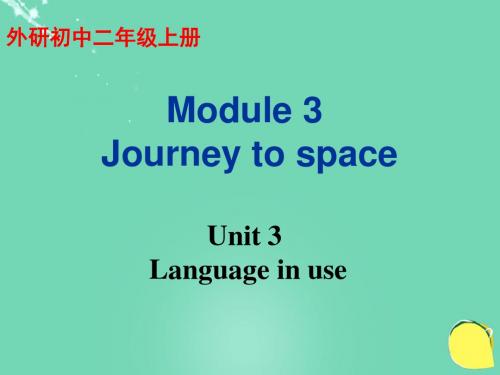初二英语(外研版)-M3Unit3 Language in use(1)-2 PPT课件
- 格式:pptx
- 大小:2.64 MB
- 文档页数:42


Unit 3 Language in useⅠTeaching modelRevision and applicationⅡTeaching methodFormal and interactive practiceⅢTeaching aims1. Function: Describing and comparing sports.2. Structure: Comparative adjectives(more); adverbs and comparative adverbs (-er, more); irregular comparatives.3. Around the world: The marathon race4. Task: Making a sports poster.ⅣTeaching aidsTape recorder , OHP , handoutsⅤTeaching StepsStep 1 RevisionTalk about the pictures.Step 2 Work in pairs.1. Ask the students to use the words in the box in Activity 1.2. Ask the students to look at the pictures in Activity 1 carefully.3. Talk about the sports.4. Read through the example with the class.—What’s your favourite sport?— My favourite sports is swimming. It is exciting.5. Work in pairs.6. Now compare the sports.1) Table tennis is more exciting than tennis.2) Tennis is…3) Basketball is …4) Football is …5) Swimming is…6) Baseball is…Step 3 Language practice1. Read through the example sentences in the box with the whole class.2. Ask the students to repeat the sentences in the box.Step 4 Grammar形容词的比较级(2)上一模块我们学习了单音节形容词和部分双音节形容词的比较级构成形式和比较级句子的表达方式。


外研版英语八年级上册Module 3 Unit 3《Language in use》教学设计一. 教材分析《外研版英语八年级上册Module 3 Unit 3》主要围绕“节日”这一主题展开。
通过本节课的学习,学生能够掌握与节日相关的词汇和表达方式,如Christmas, New Year’s Day, Spring Festival, Mid-Autumn Festival等,并能够运用这些词汇和表达方式进行简单的交流。
同时,学生还能学会如何用英语询问和描述节日的日期、习俗和活动。
本节课的主要语言功能是询问和描述节日的日期、习俗和活动,以及表达节日的喜好。
二. 学情分析八年级的学生已经具备了一定的英语基础,能够听、说、读、写一些基本的英语单词和句子。
但是,对于一些关于节日的词汇和表达方式,学生可能还不够熟悉。
此外,学生的阅读和写作能力有待进一步提高。
因此,在教学过程中,教师需要关注学生的个体差异,尽量让每个学生都能参与到课堂活动中来。
三. 教学目标1.知识目标:学生能够掌握与节日相关的词汇和表达方式,如Christmas, New Year’s Day, Spring Festival, Mid-Autumn Festival等,并能够运用这些词汇和表达方式进行简单的交流。
2.能力目标:学生能够用英语询问和描述节日的日期、习俗和活动,以及表达节日的喜好。
3.情感目标:通过本节课的学习,学生能够增强对传统文化的认识和尊重,培养跨文化交流的能力。
四. 教学重难点1.重点:学生能够掌握与节日相关的词汇和表达方式,并能够用英语询问和描述节日的日期、习俗和活动。
2.难点:学生能够表达自己对节日的喜好,以及能够运用所学知识进行真实的交流。
五. 教学方法1.任务型教学法:通过设计各种任务,让学生在实际的语言环境中运用所学知识,提高学生的语言实践能力。
2.情境教学法:通过创设各种节日情境,让学生在情境中学习、操练和应用语言。


Unit 3 Language in useⅠ. 单项选择。
1. —When ________ you ________ here?—Two days ago.A. did;comeB. have;comeC. will;comeD. do;come2. —Will you see the film Cinderella with us tonight?—No, I ________ it last week.A. seeB. have seenC. saw3. In the past few years, many schools ________ the ways of doing morning exercises.A. changeB. changesC. will changeD. have changed4. —Where is your uncle? I haven't seen him for a long time.—He ________ Beijing for about half a year. He moved there in January.A. has gone toB. has been toC. has arrived inD. has been in5. —Where are the flowers?—You see, someone ________ them to the windows.A. movesB. had movedC. has movedD. would move6. —When will you hand in your book report?—Sorry, I'm not sure. I ________ writing it yet.A. didn't finishB. don't finishC. hadn't finishedD. haven't finished7. —Hello, may I speak to Miss Wang?—Sorry, she isn't in. She ________ the office.A. has been toB. has gone toC. has been awayⅡ. 用所给词汇的适当形式填空,可借用助动词。